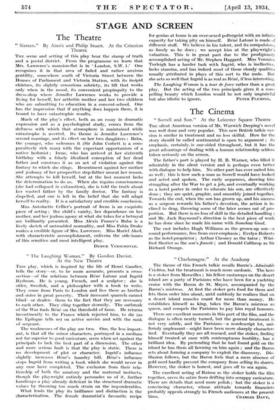"The Laughing Woman." By Gordon Daviot.
At the New Theatre Tins play, which is inspired by the life of Henri Gaudier, tells the story—or, to be more accurate, presents a cross- section—of the relations between Rene Latour and Ingrid Rydrnan. He is young, French, and a sculptor ; she is older, Swedish, and a philosopher with a book to write. They come from Paris to London and live there as brother and sister in great poverty. Their incessant quarrels cannot blind—or deafen—them to the fact that they are necessary to each other. They cling together stormily. The outbreak of the War finds Rene on the threshold of fame. He returns incontinently to the France which rejected him, to die (as the Epilogue tells us) on active service and with the rank of sergeant.
The weaknesses of the play are two. One, the less import- ant, is that all the minor characters, portrayed in a medium not far superior to good caricature, seem when set against the principals to lack the best part of a dimension. The other and more serious fault is that the play is static. There is no development of plot or character. Ingrid's influence slightly increases Rene's laundry bill. Rene's influence stops Ingrid from writing a book which she would never in any case have completed. The exclusion from their rela- tionship of both the amatory and the maternal instincts, though the playwright entirely persuades us of it, further handicaps a play already deficient in the structural dramatic values by throwing too much strain on the imponderables.
What lends the play its brilliance and distinction is the characterization. The female dramatist's favourite recipe
for genius at home is an over-sexed poltergeist with an infinite capacity for taking pity on himself. Rene- Latour is made of different stuff. We believe in his talent, and its convulsions, as firmly as he does ; we accept him at the playwright's valuation. This is in great part due to the prodigiously accomplished acting of Mr. 'Stephen Haggard. Miss Veronica Turleigh has a harder task with Ingrid, who is *ineffective, lacks stamina, and has indeed most of those cloudy qualities usually attributed in plays of this sort to the male. But she acts so well that Ingrid is as real as Rene, if less interesting.
The Laughing Woman is a tour de force rather than a great play. But the acting of the two principals gives it a com- pelling beauty which London would be not only ungrateful
















































 Previous page
Previous page